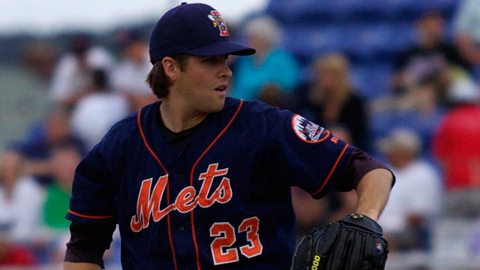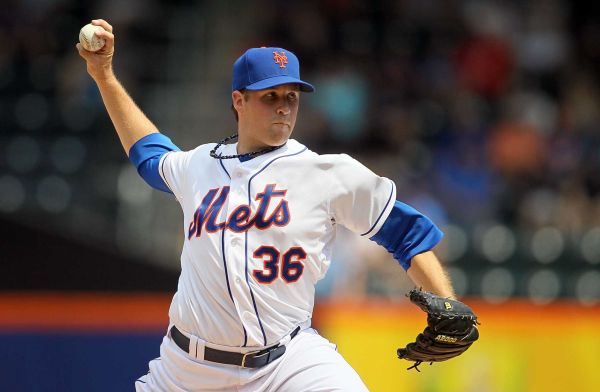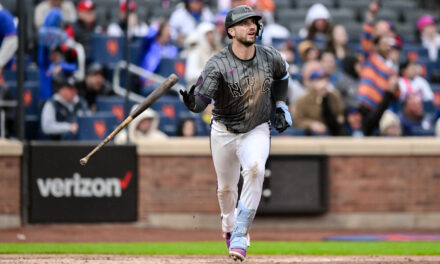In Part One of my story, we left off with a discouraged Collin McHugh coming off a mediocre junior year at Berry College in Georgia. McHugh found himself at home watching the 2008 MLB Draft, more out of habit than because of any expectation that he would be selected. But then the phone rang… It was the New York Mets.
By Elliot Chester
McHugh was floored. Beasley had known it was coming.
“I knew Collin had a shot when he left,” says Beasley, “and I said, ‘If any of our kids go [to the bigs], it’d be Collin.’ And the reason why is Collin’s self-worth, how he’s doing, how he feels about himself—is not how good he does on the field and how good he doesn’t do.
“He’s a winner with anybody—understand that,” demands Beasley with a surprising urgency. “His faith”—a pause, as though for greater effect—“centers him. A lot of kids go out and they struggle, and it just beats them down, and it beats them down, and they can’t put it behind them. Collin can because of the faith that he has.
“It’s amazing; I think it’s a great thing. It’s one of the reasons why I actually think he has a great chance to make it.”

IV.
As an 18th-round draft pick, McHugh knew that his would be a long and arduous path to the majors. But his faith and innate competitiveness told him that he should jump at the chance. “I wouldn’t have a career, I wouldn’t be playing baseball if that isn’t exactly what G-d wanted for me,” says McHugh. “If I’m still playing, then there’s a reason I’m still playing.”
He played in an assortment of minor league cities that seemed lifted straight from a Johnny Cash song, from Kingsport to Savannah to Port St. Lucie to Binghamton to Buffalo—and those were just the home sites, every possible location within the Mets’ system. Life became an endless road trip of Hot Tamales, Diet Cokes and uncertainty. In the offseason, he made ends meet by working full-time at Boosterthon Fun Run, an organization that holds miniature track-style events at local elementary schools as fundraisers.
To pass the time during the season, McHugh began writing a blog entitled, “A Day Older, A Day Wiser,” a day-by-day tale of life in the minors that alternately reads like a travelogue and a cathartic exercise in creative writing much like the kind that McHugh used to do in Mike Mejia’s English 101 class back at Berry. In his blog, McHugh sounds off on arrogant ballplayers, faith, the art of pitching and pranks like “The Wet Towel,” and “The Hat Bubble,” along with everything in between.
He also married Ashley (better known as “Buzzy”) a former high school classmate whom he took on a date while home from college in 2006. After grabbing dinner at California Dreaming in Duluth and laughing along to Little Miss Sunshine, the pair struck up a long conversation in Buzzy’s driveway. “We realized at that point, ‘We are very compatible, we get along really well,’” says McHugh. “We’d grown up very differently, we have very different personality types, but for whatever reason, we connected.”
By 2010, Buzzy would frequently join McHugh on the road while also operating Buzzy Craftery, a web service dedicated to providing home-spun goods of all kinds, and providing a healthy and loving dose of perspective. When he speaks of his goals as a pitcher, McHugh uses the first-person plural.
In late May of 2011, McHugh was struggling to the tune of a 6.31 ERA at Class A St. Lucis, when, manager Pedro Lopez called McHugh into his office after another tough outing and announced, contrary to the laws of reasonable expectations, that McHugh was headed to AA Binghamton for a spot start and maybe a stint in the bullpen. It just so happened that Binghamton had a doubleheader on the day McHugh was scheduled to make his next start, and his prior experience working as a starter and the bullpen made him a valuable commodity, enormous ERA notwithstanding.
One start turned into two, then three, then an indefinite number that eventually settled at 16 by the season’s end, the stint in the bullpen reduced to two spot long-relief efforts about seven weeks apart. In August, McHugh tossed six scoreless innings in the Red Sox Futures at Fenway game and felt, for the first time in his professional career, “like I belonged.” When all was said and done, McHugh had racked up eight wins at Binghamton and earned a spot in the Arizona Fall League, slow start at St. Lucie be damned.
After another posting a stellar 2.41 ERA in his first twelve appearances (all starts) with Binghamton in 2012, McHugh earned a promotion to AAA Buffalo and got another start at Fenway on August 18, where he shone once more, scattering five hits over seven scoreless innings in earning his second win for the Bisons. “It doesn’t really matter where you go,” says McHugh, playing down the significance of his encore at Fenway. “The talent is the most important factor, not the stadium you play in.”
V.
A few hours later and about 400 miles down I-95, the Mets eked out a 2-0 victory over the league-leading Washington Nationals for just their 11th win since the All-Star break. The victory represented a small bright spot for the reeling squad, which had raced out to a surprisingly strong first half thanks to heroic pitching from R.A. Dickey and Johan Santana and a scrappy approach at the plate that made them the third-best scoring offense in the National League by the break. However, the team quickly unraveled in mid-July, doomed by a rash of injuries, poor plate discipline and a nightmarish bullpen, to the point that even with their victory that Saturday evening, they remained nine games out of a playoff spot.
Following the win over the Nationals, things went from bad to worse, as the Mets returned home the following week and promptly lost three straight games to the Colorado Rockies, who had begun the series with a dismal 46-73 record and fielded a lineup that consisted of Carlos Gonzalez, Wilin Rosario and a host of players best described as “marginal.”
Greg Prince, a longtime fan who writes about the Mets for the popular blog “Faith and Fear in Flushing,” was among those who knew that even by the Mets’ standards for awfulness and heartbreak, this was bad.
“That was a really miserable week for the 2012 Mets,” remembers Prince, who attended the first two games of the series. “They played about as disinterested a brand of baseball as I’ve ever seen them play, and I’ve been watching them for more than 40 years.”
After watching Wednesday’s loss on his television, Prince was back at the ballpark on Thursday afternoon for his 111th game at Citi Field since the park opened in 2009, displaying the streak of pseudo-sadomasochism that often defines Mets fans. As Prince arrived with a friend at his seats in the back of Section 131, near the foul pole in left field, he did feel some small cause for optimism.
“I expected a little excitement, I guess. Because it’s fun to watch a guy make his major league debut,” says Prince.
VI.
That guy was Collin McHugh, who had arrived in New York the previous day via the MLB’s “super-convoluted” (as McHugh calls them) taxi squad rules, based on the probability that he would have to take an injured Santana’s place in the rotation. As had happened the previous year, his call-up was based at least as much on serendipity as performance: August 23, the date of Santana’s next scheduled start, was McHugh’s day to pitch.
McHugh spent Wednesday evening of the 22nd in a limbo of shifting hotels and confused communication with Buzzy, who was among those trying to decide whether she should risk it and fly up. Eventually, he got the word that he would definitely be starting and went to sleep knowing that he would toe the Citi Field rubber the next afternoon.
He rose early that Thursday morning and lingered over breakfast with Buzzy before heading to the ballpark around 10:00 a.m. There, McHugh quickly discovered one of the many perks of his newfound status as a big leaguer, one that still amazes him today.
“You have grown men and grown women cooking food for you every day and it’s just incredible,” says McHugh. “I don’t know how anybody could ever complain, even if the food is not top-notch; you have people who, their job is to cook for you. I don’t know that I’ll ever get over that.”
As McHugh went into his pregame routine an hour before the scheduled 1:10 p.m. start, 15 of his closest friends and family—Scott and Teresa, two of his three siblings, Buzzy, Cantrell (who needed an unexpected refund on his homeowner’s insurance to afford the pre-dawn flight to New York), his boss from Boosterthon, his agent, and a few others—filed into the park to watch the unathletic kid who barely scraped his way onto the JV team in 8th grade make his major-league debut. Back in Georgia, the entire Berry Vikings roster, few of whom had actually played with McHugh, piled into Beasley’s home to watch the action unfold on television. And out in left field, Greg Prince made conversation and occasionally fretted about his poor view of the man on the mound.
But by the time McHugh fanned LeMahieu for his seventh strikeout to end the fifth, Prince realized that he was watching a special performance, “maybe unprecedented in some fashion.”
Unlike so many of those watching, McHugh refused to consider the implications of his performance as the game went on and the strikeouts piled up. “When you’re in the middle of it, you just want to ride it: you’re like, ‘I don’t want to question it, I don’t want to know why it’s happening, but I’m just gonna ride it out,’” explains McHugh, who primarily utilized a live fastball that topped out at 93 mph and a biting curve that frequently clocked in the 60s and produced three swinging strikeouts.
Meanwhile, the Mets, in the midst of an historic hitting slump, appeared to be doing everything within their power not to score. In the second inning, Ruben Tejada looped an apparent single to center with one man out and Mike Baxter on first—except Baxter misread the play and was cut down at second for an embarrassingly rare 8-6 force play. The following inning, hotshot rookie Jordany Valdespin led off with a single and was promptly thrown out trying to steal second. And in the seventh, Valdespin failed to bunt Ronny Cedeño into scoring position after Cedeño grounded a base knock just past short while pinch-hitting for McHugh.
“It just added to the frustration,” says Prince. “They were getting this fantastic first-time pitching performance, and we may not win. He may not get a win.”
With McHugh out of the game, manager Terry Collins called on Bobby Parnell to keep the game scoreless. On Parnell’s second pitch, Tyler Colvin drilled a playable line drive at Valdespin in center field. Valdespin, a middle infielder in the minors, took three bounding steps towards second base before realizing the ball was over his head; by the time it reached the infield once more, Colvin was coming out of his slide at third. Five pitches later, Chris Nelson grounded a hanging 0-2 curveball past an in-on-the-grass Tejada for what would prove to be the game’s only run, leaving McHugh with a no-decision and a most bittersweet experience.
“After the game, you’re in the locker room trying to balance those emotions,” says McHugh. “You’re like: ‘I’m glad I threw the ball well, but these guys have been battling their asses off all year and just can’t seem to quite put it together,’—it’s tough for them, because they’ve been here the whole time, and they’ve got a more full context and full perspective of what a game like this actually means.”

VII.
If the previous 24 hours had ranked among McHugh’s finest (and most unrewarded) as a pitcher, the next 24 certainly came nowhere near the new standard. In the aftermath of McHugh’s brilliant start, local radio host Mike Francesa began his afternoon talk show following the game with a furious, guttural scream-filled ten-minute explosion in which he condemned anything and everything Mets, including McHugh (who has not heard the broadcast).
“When was the last time the Mets talked about McHugh before yesterday?,” asked Francesa, overdone righteous anger winning out over the languid intonations that normally dominate his speech pattern. “Now today [they say] he did something that hasn’t been done since Juan Marichal…he’s facing a triple-A lineup! You forget one thing: they just got swept by a team that came in at 46-73.”
It was guilt by association, a logical fallacy nonetheless by and large accepted by listeners driven mad by the team’s listless play.
The following morning, McHugh was doing his routine post-start jog around a big-league stadium for the first time in his career when, as he passed by the dugout, Collins called him into his office. Confused, McHugh followed his manager and discovered an assemblage that included pitching coach Dan Warthen and several other members of the Mets brass. “Whenever a coach and the manager and front office people get together, you kind of assume the worst,” remembers McHugh.
He can recall the general thrust of the conversation: We love what you showed us yesterday. We need to make room for Jeremy Hefner to come off of paternity leave. You’ll be back in 10 days. This is what’s best for you. For the first time in his career, after the best game of his life, Collin McHugh was being demoted.
VIII.
McHugh’s Rotoworld page tells the story of his September:
• Mon, Sep 3: Collin McHugh takes loss to Cardinals
• Mon, Sep 10: McHugh blasted in loss to Nationals
• Tue, Sep 25: Collin McHugh hammered in loss to Pirates
• Wed, Sep 26: Collins believes McHugh is ‘out of gas’
McHugh did indeed return to the bigs as promised and made his next start, the first of seven more appearances, on Labor Day against the playoff-bound Cardinals. The St. Louis game would be the last time he would pitch on his usual schedule, the Mets’ recent concern for his routine apparently lost among the Merry-Go-Round of prospects that needed to gobble up those precious, useless September innings.
McHugh insists that his struggles were due to a combination of factors. “Ultimately what it comes down to is: I didn’t execute very well in a lot of those outings,” says McHugh. “You can chalk it up to, I was 35 innings more than I had been the year before, I was throwing out of the ‘pen for a while, which I hadn’t done in a couple years and don’t have very much experience doing. Or you could chalk it up to: I was just a little bit out of gas, you know, my mechanics were getting a little bit funky, [I was] battling a little bit of arm fatigue and all that combined—it just turned into kind of a string of rough outings in a row.
“I talked to Terry and I talked to Dan on a daily basis,” continues McHugh, “just kind of like, ‘Hey, what do you see, what do I need to work on?’ We watched video, we worked mechanically, and I think it kind of was their observation that not a whole lot’s changing, it looks like he’s just kind of running out of gas towards the end.”
IX.
The end, at least for now, came on October 2, 2012 in Game 161 of a lost season, when McHugh was called upon to preserve a 3-3 tie in the bottom of the 11th against the equally moribund Miami Marlins. On his first pitch he gave up a triple to ex-Met Jose Reyes, forcing him to intentionally walk the bases full. With one out, Donovan Solano poked a slow ground ball past second base to drive in Reyes. It would prove to be the final desultory loss of the season for the Mets, and the fourth of McHugh’s still-winless major league career.
It was a game filled with heartwarming storylines: The return of Adam Greenberg, hit on the head by the first pitch of his big-league debut, to the majors after seven years away. The redemption of Solano, who struck out in his first four at-bats. The quest for win number 21 by the oft-discarded knuckler Dickey.
And then there was Collin McHugh, who stoically walked off the field with an expression indistinguishable from the one he wore when walking off the mound on that briefly glorious (or maybe gloriously brief) afternoon in Flushing.
It may be the last pitch he ever throws for the Mets, especially given the team’s recent acquisitions of the reliable Shaun Marcum to fill the temporary gap in their starting rotation and of Scott Atchison and LaTroy Hawkins to provide late-inning right-handed relief. So while McHugh has, for the first time in his life, an invite to big-league camp, it’s tough to say what that will bring beyond a shot at eating up innings out of the bullpen in the most lopsided games.
In the meantime, he works out. He throws. He visits Beasley and the rest of the Vikings at Berry, checks in at Boosterthon. He tweets. He spends time with Buzzy and his family.
He waits.
X.
McHugh spent a month this offseason reading Dostoevsky’s Crime and Punishment and enjoyed it even as he found it “very bleak” and “kind of depressing” at times. He went to see the film Les Misérables and thought it was fabulous. Both offer tales of redemption, of second chances.
“For me,” confides McHugh, “when I see something like that, it just reminds me of my faith, of what Jesus did for me, and I’m thinking, ‘Gosh, I’m so thankful. I’m so thankful that I don’t have to live this,”—he pauses for a moment, as if searching for the right word—“subsistence life where you’re trying to get through and [do] whatever you can to make it to the next day, and make it to the next day—there is a hope, a second chance.’”
“I’m kind of a sucker for happy endings and for a nice little clean wrap-up to stories,” finishes McHugh.
There is no guarantee that McHugh’s story will have such an ending. About all that is certain is that, in less than a week’s time, he’ll be on a pitching mound in St. Lucie once more, throwing 91-mile-per-hour four-seamers that tail away from lefties.
He might yield a double, as he did to Charlie Blackmon. He might earn a swing and a miss, as he did against pretty much every other Rockie for the next seven innings.
Either way, he will get the ball back, toe the rubber once more and peer in for the sign like nothing happened. He will do this until—well, who can really say?
“Every step along the way, there has been every reason that I should not be playing anymore,” says McHugh.
Yet here he is…
XI.
This Fan Shot was contributed by Elliot Chester. Have something you want to say about the Mets? Share your opinions with over 15 thousand Mets fans who read this site daily. Send your Fan Shot to [email protected]. Or ask us about becoming a regular contributor.














